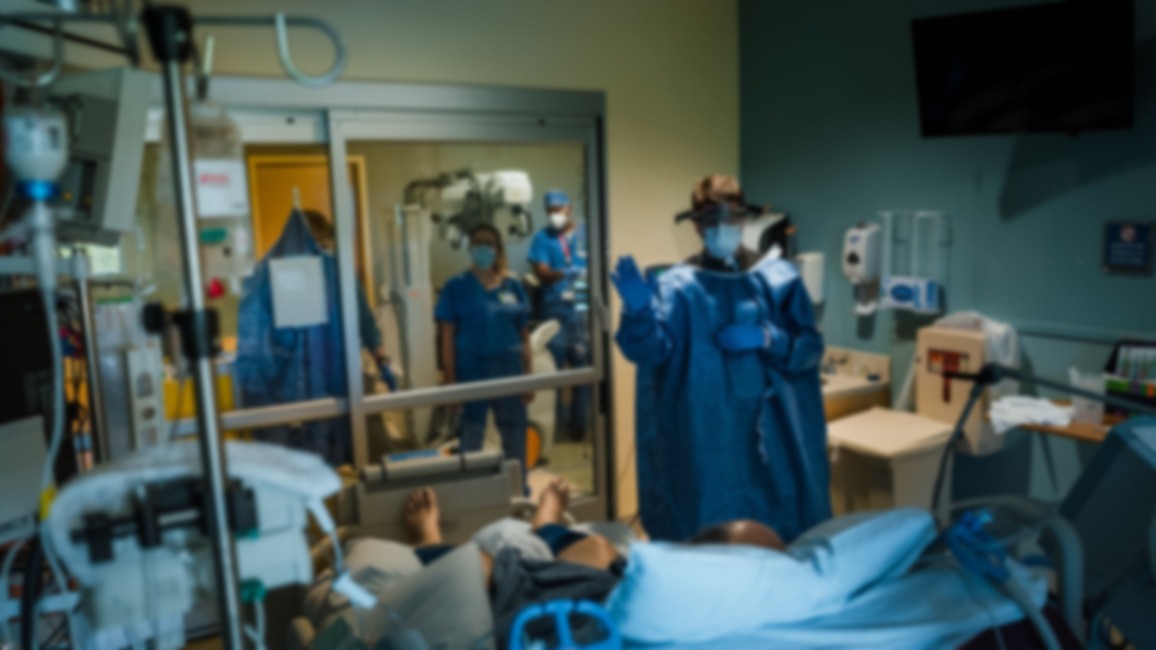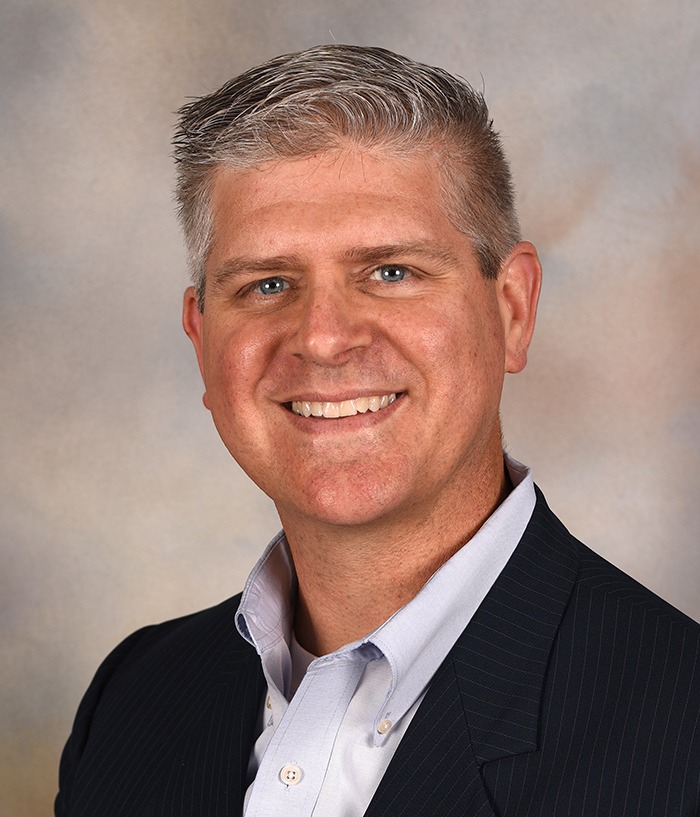Scenes From A Pandemic Leave A Lasting Impact

Photo by The New York Times
Rev. Chris Yost, senior pastor at Wesley UMC Greenville, shares his account of praying with patients, families and caregivers at a local hospital
About six weeks ago, our local hospital sent out a countywide appeal to clergy to come pray over the ICU patients and staff and the COVID Unit. Since then, I have gone every Monday from 7:30 p.m. to 9:30 p.m. and Thursday from 10 a.m. to noon. My mission was to pray over the patients, with any families who wanted to pray together and check on staff in between their frenetic work.
I was asked to share the following after talking to a group of fellow United Methodist clergy. If you take nothing else from this, know this: Our healthcare providers are walking through the valley of the shadow of death every day, every hour, for months on end. Is God with them?
This is the abridged experience I had with them. This occurred in less than 60 minutes. This is every day for them.
***
 There was no usual “check in” at the ICU nurses station; it was too busy. I waved, the charge nurse acknowledged me, and I started praying outside the negative pressure rooms housing COVID-19 patients.
There was no usual “check in” at the ICU nurses station; it was too busy. I waved, the charge nurse acknowledged me, and I started praying outside the negative pressure rooms housing COVID-19 patients.
Within a few minutes, one nurse stopped me and said, “Oh good, you are the pastor right?”
“Yes, how are you today?” I asked.
Her eyes squinted, revealing a smile behind her mask. “The man in room 8 is going right now. We have given him what we can to keep him alive for his family to arrive. He’s not going to make it. Will you go pray with him?”
“Absolutely.”
She raced off down the hall saying, “Thank you so much, you do not know what this means to us.”
I donned the PPE and entered to see his last faint attempts to gasp for air … this was a prayer of thanksgiving for whatever life he had among us; he was already gone.
***
It seemed 3 minutes later the same nurse popped in to say, “We need you in 4 right now. She is dying, there is family with her and they asked for someone to pray.”
“Do I switch out PPE?” I asked.
“Yes” barely made it to my ears before the door closed behind her. I removed the gear and donned another set to enter 4 – these nurses do this multiple times an hour, I thought.
Sure enough, her heart was on the AV node generated beat. Her daughter and two others surrounded her with fogged up face shields Their masks were soaking wet from tears and stuffy noses. Others were on a compassion iPad joining remotely to witness their loved one’s passing. I prayed with the family.
A short time later, we walked out together clumsily removing gear and talking. The hospital chaplain, Rev. Bill Shaddox, arrived to be with them. I introduced them and continued on my rounds.
***
I walked around the corner to see the ICU shift nurse in the closed end of the hall, facing a man whose arms were flailing about. He was yelling about not wanting to hear what she was saying. The first few weeks, I heard multiple stories of family members getting rough with staff. I drew near in a way that would make the man take notice of me. It also created the need for him to shift his body position so he was no longer blocking the nurse’s way.
“Who are you!?”
“I am a clergyman here to check on you.”
With a yellow sticky note in one hand, he pointed aggressively with his other index finger nearly yelling, “I want you to find this son of a b**** doctor so I can kick his a**. He just told my son he has a 1% chance of living off the ventilator and 5% if he goes on it. I want a piece of him.”
This was a classic case of the doctor and nurses speaking facts to a person who did not need facts, but someone to understand: his 41-year-old son was dying and he had nothing but a sliver of hope left.
“It seems like you feel the information reported directly to your son like that felt like they were taking away his hope,” I said with all the empathetic compassion I could muster.
“You’re G*d d*mn right they did!”
“As a father, we would do anything to spare our kids this kind of suffering” I said.
“My son doesn’t need to hear this, tell me, not him.”
Tears streamed down his face as he balled up the yellow sticky note and put it in his pocket. (His son, a father of five including a newborn, passed away over the following weekend.)
***
I left the ICU and made my way upstairs. I approached the nurse's station to see a younger nurse visibly disturbed. They had a 50-something-year-old man who walked to his room 48 hours before plummet with COVID and died.
Our conversation did not suffer much chit chat. She quickly reported how she felt: “There is so much pain. I feel so much pain. Some of these people hate us, I can feel it.” She has her hand over her solar plexus.
I asked her if she believed she “felt people,” as in she could sense things about people without anything being said.
She said with relief and exasperation, “Yes, I am so tired of feeling all of this pain. It hurts.”
For the record, I have never entered into such a spiritually deep and intuited conversation this fast in my life. In less than 5 minutes, I was talking about the gift of feeling people like this.
“The way I understand it is this is a gift, although I have not always considered it a gift. I equate it with a door or a valve. While I have found I do not have much control when 'it is open' or when 'it is closed,' the direction of the ‘flow’ can be up to us. In other words, if we feel such things coming into us from people, we can ‘tap into’ the presence of God and that gift of God’s presence can also flow out of us.”
We spoke about patterns of prayer that can keep us “filled up” with God so when the “door opens, we can let that flow out.” I did not know what else to say, except to offer what someone would have said to me 20 years ago when I noticed a similar phenomenon.
***
Here are some other interactions to consider:
“We are fine so far. The day shift really had it bad. They lost five, we lost a dozen over the weekend.”
“The first round was almost all people who had had a good life. It just may have been time for them. These are young people this time. These are my best friends’ husbands, siblings, my friends. I went to school with these people (30- to 40-year-olds). I can’t save them.”
“I am so sick and tired of people talking on TV and social [media] about what they know. They do not know anything! I wish we could do tours down here [ICU] and let them see what is happening. It does not take long to see, this is hell. This is real.”
“I am just numb. I guess this is just the way it is. We save people, we can’t save these people.”
“Everyone except one is unvaccinated. This is ALL preventable.”
“I am in the grind now. I just have to accept these people don’t get it. Then we care for them, because it’s not like we will not care for them. They just don’t have to go like this … but, yes, we are going to do everything we can to save them.”
“We’ll keep doing all we can. I’m a nurse, I will give everything to everyone. It’s not enough, but we’ll keep giving it all.”
Published: Wednesday, September 15, 2021
